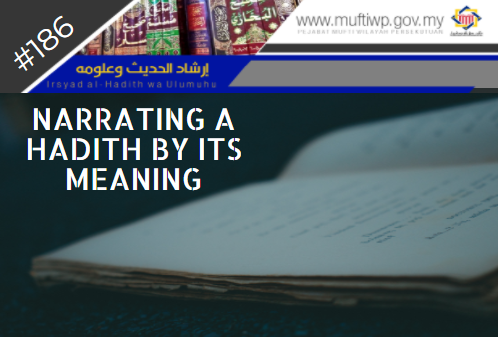
Question:
What is the ruling of narrating a hadith by its meaning?
Answer:
Alhamdulillah, praise and thanks to Allah for the countless blessings He has blessed us all with. Blessings and salutations to the Prophet Muhammad PBUH, his wives, his family, companions and all those that follow his teachings to the day of judgement.
It is generally known that the best of people are those who always give benefit to others. This is because, the best of words are words of calling other people towards good deeds and prevent them from evildoings. This is stated in al-Quran by His SWT saying:
وَمَنْ أَحْسَنُ قَوْلًا مِّمَّن دَعَا إِلَى اللَّـهِ وَعَمِلَ صَالِحًا وَقَالَ إِنَّنِي مِنَ الْمُسْلِمِينَ
And who is better in speech than one who invites to Allah and does righteousness and says, "Indeed, I am of the Muslims."
Surah Fussilat (33)
Referring to the above question, the scholars have differing opinions in permitting a person to narrate a hadith by its meaning. Before we explain on the ruling, we would first like to explain what does it mean by narrating a hadith by its meaning. It means a person narrates a hadith by using a different choice of words than the original text of the hadith.
Even if the ruling of narrating hadith by meaning is an issue with differing opinions among the scholars, but the jumhur permits it while the person must comply with the conditions set. Among the conditions are: [See: al-Minhaj al-Hadith, 58]
- A person who intends to narrate the hadith forgot its lafaz or matn when he is asked to narrate the hadith based on his memorization.
- A person who intends to narrate a hadith by its meaning need to be well-versed in Arabic language so that the meaning of the hadith will be free from any changes.
- Certain lafaz or matn of the hadith cannot be changed with other words even if its meaning is the same as the lafaz of a du’a taught by the Prophet PBUH because the lafaz is an ibadah when one recites it. This is because there is no other lafaz the same as what is used by the Prophet PBUH in a certain du’a or dhikr.
In addition, Imam al-Suyuthi cited in his book that jumhur from salaf and khalaf including the imam of 4 madhhabs permit narrating hadith through its meaning. [See: Tadrib al-Rawi, 314]
We are of the opinion that the best practice is for a hadith to be narrated in its original lafaz or matn. However, if one forgets its original lafaz or matn, then it is permitted for him to narrate the hadith by its meaning after fulfilling the stated conditions above so that the original meaning of the hadith may be preserved.
Closing
In conclusion, narrating a hadith by its meaning is permitted when a person fulfils the above condition. There is one other thing which is commanded to be fulfilled and is not a condition because it is more towards ethics which is saying something ‘exactly the same as what is mentioned by the Prophet PBUH’ after narrating a hadith by its meaning. Lastly, may Allah SWT give us understanding in the religion and then reside us among the people of His everlasting paradise. Ameen.
Wallahua’lam.

